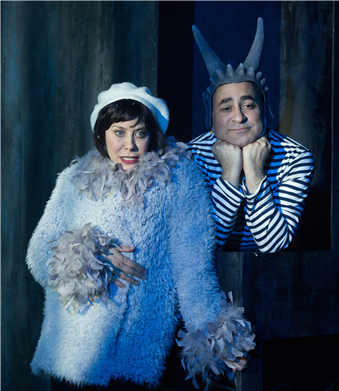By MARK BLANKENSHIP
Of course Dash's arm falls off. When you lose someone, it can feel like losing a limb, and in City Of, now at the Peter Jay Sharp Theater in a Playwrights Realm production, feelings like grief (and love and hope) become physical facts.
Dash, a man traveling to Paris in the wake of his mother's death, isn't the only one whose internal life becomes reality. Every character in Anton Dudley's play, from other Americans seeking answers in France to a talking gargoyle on the top of Notre Dame, exists in world where a singing voice can be tucked inside a handbag and an art love can step inside a painting. That's arguably what the theatre's for: showing us things that may not be literally possible but are still emotionally true. "There are times in life where emotions become your logic," Dudley says. "Those images, if they're moving the plot forward, feel very real to me."
Advancing the story is key. That's how Dudley knows a fantastical element is crucial to his show.
"When you get into the world of the play---and this sounds a little magical, maybe---it starts writing itself," he says. "As long as you're committed to the reality of the characters' experiences, the play develops its own language. That's why I like to give my stage directions a personality, because I feel like that lets the director and the designers hear the tone of what the play wants to be. The theatricality of the play, through the stage directions, becomes its own character."
At the same time, the director and designers also teach Dudley about his own work, especially once the show is in rehearsal. "As soon as you put something on stage, you realize the three-dimensional life of the play is communicating in a way that lets you pull away language," he says. "The mere fact that a character walks over to another character---there's a whole speech in that [action] that the audience can hear."<!--more-->
Take the nearly-wordless scene in City Of when Dash enters a painting his mother loved. Everything from the lighting to actor Devin Norik's body suggests the power of love and pain and art.
"That's a moment that takes some explaining in the script, and I had a lot of language in there explaining what was happening," Dudley says. "But when you see it, you say, 'Oh, I get it.' The language actually bogs down the moment. It's about the power of art, so let the art do the work."
Meanwhile, it's good for Dudley to know that Dash actually <em>can</em> enter the painting---that the creative team can turn his poetic stage directions into actual events. "It's nice to learn that the more magical elements of the play are indeed possible to achieve," he says. "I write something like 'the snow turns green,' and I don't know how to make that happen. But that's the fun for the director and the designers to figure out. And when it happens, it's quite wonderful."
---
Mark Blankenship is TDF's online content editor
Photo by Matthew Murphy
